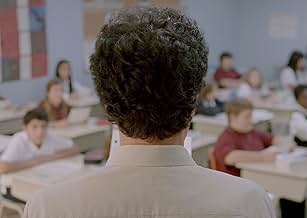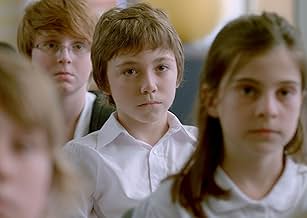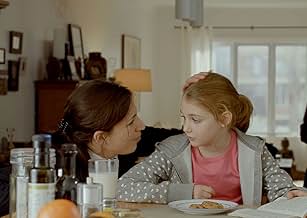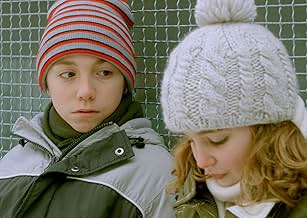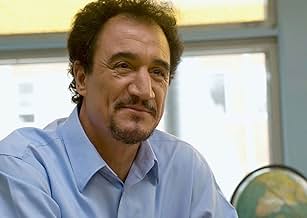At a Montréal public grade school, an Algerian immigrant is hired to replace a popular teacher who committed suicide in her classroom. While helping his students deal with their grief, his o... Read allAt a Montréal public grade school, an Algerian immigrant is hired to replace a popular teacher who committed suicide in her classroom. While helping his students deal with their grief, his own recent loss is revealed.At a Montréal public grade school, an Algerian immigrant is hired to replace a popular teacher who committed suicide in her classroom. While helping his students deal with their grief, his own recent loss is revealed.
- Director
- Writers
- Stars
- Nominated for 1 Oscar
- 30 wins & 14 nominations total
Mohamed Fellag
- Bachir Lazhar
- (as Fellag)
Nicole-Sylvie Lagarde
- Psychologue
- (as Nico Lagarde)
- Director
- Writers
- All cast & crew
- Production, box office & more at IMDbPro
Featured reviews
This film has what it takes to be one of the 5 entries in Oscar 2012 foreign film category. Unlike another french film 'un class', Monsieur Lazhar deals with the issue of moving on from a tragic event, to continue carrying out the role of teaching schoolchildren.
I am only half correct to say that this movie deals with the healing process, because while it seems to be that way, observers will realize that it is not quite possible to heal the wounds of all parties, due to bureaucracy, conflicts and cultural differences. And it is not possible to pretend that nothing has happened either. What I find fascinating about this film is that it chose not to be too ambitious in finding a good conclusion, but introduces all the elements of restraint and helplessness by the characters.
However, the movie offered surprises especially in the development of certain characters. Even though I disagreed with some of the support methods carried out (the movie sometimes forget these kids were below 12 years old) and I would have hoped to see more positive aftermath from the movie, the ending was very satisfying, when Lazhar, given the compromising situation, decides to give his classroom something that their previous teacher failed to do.
I am only half correct to say that this movie deals with the healing process, because while it seems to be that way, observers will realize that it is not quite possible to heal the wounds of all parties, due to bureaucracy, conflicts and cultural differences. And it is not possible to pretend that nothing has happened either. What I find fascinating about this film is that it chose not to be too ambitious in finding a good conclusion, but introduces all the elements of restraint and helplessness by the characters.
However, the movie offered surprises especially in the development of certain characters. Even though I disagreed with some of the support methods carried out (the movie sometimes forget these kids were below 12 years old) and I would have hoped to see more positive aftermath from the movie, the ending was very satisfying, when Lazhar, given the compromising situation, decides to give his classroom something that their previous teacher failed to do.
This absorbing film, set in Montreal, ties together two tragedies and by such a linkage shows our capacity for human understanding and emotional empathy. While that may sound excessively depressing to some readers, I found a semblance of hope in this film as the characters, both young and old, try to move on with their lives and cope as best they can, and while the trauma may be a permanent part of their psyches, their seeming resilience conveys a kind of worldly maturity and acceptance.
The film opens with two school children discovering a favorite, but troubled, teacher who has hung herself in her classroom while her students are at recess. Psychologists are brought in to help the students cope with the emotional intensity of such a tragedy, and then later a Mr. Bachir Lazhar, an Algerian immigrant, presents himself to the principal as a suitable replacement for the suicide victim's class telling her how he's followed the school's trauma in the newspapers and he's available to help. Does he need the work (we find out his legal status is uncertain and he's in danger of being deported) or is some unconscious empathetic force driving him toward working with these students since he seems to understand their pain? The school authorities prefer to move on from the tragic event while Mr. Lazhar can sense after a number of months that some of his students are dwelling on their former teacher's act and her reasons for doing so; he encourages them to talk in class about their feelings and for this he is rebuked. We eventually discover the horrific tragedy surrounding his own family and why he's fled to Canada, and from this we can understand and appreciate his empathy for his students and his understanding of their emotional plight ("why did she do it in her own classroom during school?"). The film has many touching moments as this strange Algerian immigrant explains the "unexplainable" to his students and they in turn seem to provide him with an emotional outlet, and a purpose, to counter his own suffering.
Some reviewers have questioned the film's seeming lack of total emotional resolution, but life can be open-ended. Will these children completely heal (as much as they can) and will Mr. Lazhar's half-year encounter with these kindred souls give him the emotional basis for sustaining a meaningful life in a foreign environment? We don't really know, but some of the signs that the film depicts seem to be favorable. A very worthy film from Canada!
The film opens with two school children discovering a favorite, but troubled, teacher who has hung herself in her classroom while her students are at recess. Psychologists are brought in to help the students cope with the emotional intensity of such a tragedy, and then later a Mr. Bachir Lazhar, an Algerian immigrant, presents himself to the principal as a suitable replacement for the suicide victim's class telling her how he's followed the school's trauma in the newspapers and he's available to help. Does he need the work (we find out his legal status is uncertain and he's in danger of being deported) or is some unconscious empathetic force driving him toward working with these students since he seems to understand their pain? The school authorities prefer to move on from the tragic event while Mr. Lazhar can sense after a number of months that some of his students are dwelling on their former teacher's act and her reasons for doing so; he encourages them to talk in class about their feelings and for this he is rebuked. We eventually discover the horrific tragedy surrounding his own family and why he's fled to Canada, and from this we can understand and appreciate his empathy for his students and his understanding of their emotional plight ("why did she do it in her own classroom during school?"). The film has many touching moments as this strange Algerian immigrant explains the "unexplainable" to his students and they in turn seem to provide him with an emotional outlet, and a purpose, to counter his own suffering.
Some reviewers have questioned the film's seeming lack of total emotional resolution, but life can be open-ended. Will these children completely heal (as much as they can) and will Mr. Lazhar's half-year encounter with these kindred souls give him the emotional basis for sustaining a meaningful life in a foreign environment? We don't really know, but some of the signs that the film depicts seem to be favorable. A very worthy film from Canada!
What happens when a class of 6th graders loses their beloved teacher to suicide? What happens when an Algerian immigrant applies to be their new teacher in a culture he is just beginning to understand? What is behind the teacher's stillness, his smile and his sad eyes? This film is a beautiful rendering of a stage play about love and loss, but also about hope. In this wonderfully-told story, the hope isn't trite, contrived or artificial. It's something you almost have to feel. It comes from the growing relationship between this strange teacher in a strange land, and his student children, so in need of his help.
The movie's cast is rich with great acting, by the kids of course, but here, if anything, they're outshone by Algerian actor Mohamed Fellag, whose face tells 1000 stories about where he has been and, perhaps, where he hopes to go.
The only things not perfect are the characters, for this writer and director have been too careful to give them - even the "best" of the children - no flaws. They are all more good than bad, but also complex in their own way, suffering the loss of one teacher and the growing pains of learning to learn from another.
This film gets my vote for Best Foreign Language Film, even over the excellent A Separation. Don't miss it!
The movie's cast is rich with great acting, by the kids of course, but here, if anything, they're outshone by Algerian actor Mohamed Fellag, whose face tells 1000 stories about where he has been and, perhaps, where he hopes to go.
The only things not perfect are the characters, for this writer and director have been too careful to give them - even the "best" of the children - no flaws. They are all more good than bad, but also complex in their own way, suffering the loss of one teacher and the growing pains of learning to learn from another.
This film gets my vote for Best Foreign Language Film, even over the excellent A Separation. Don't miss it!
10sugith-1
This film won Canada's Genie for best film and deserved it. The story is simple and profound, contemporary and timeless at the same time. After the suicide of a grade school class teacher, a new teacher appears ready to take over the class. An Algerian immigrant, Monsieur Lazhar brings such a deep humanity to his job, that the traumatized kids are able to come to terms in some ways with what has happened. What they don't realize is how much their new teacher knows of their pain first hand.
Fellag's performance as the title character is note perfect and gigantic. The children are astonishing and the final scene, the final moment will crush even the most stoic viewer's resolve not to weep.
Fellag's performance as the title character is note perfect and gigantic. The children are astonishing and the final scene, the final moment will crush even the most stoic viewer's resolve not to weep.
Saw this last night as part of a Canadian Film Festival. It's a real gem that negotiates it's way around trauma and intimacy with tact while never preaching. It's a true humanist film in that it attempts to deal with the real issues of being a human being in a realistic and sympathetic way. I'm a fan of Ken Loach, but at times he can make his films too didactic. This movie never does that. The performances are universally excellent and it's open ended structure allows you to go away with multiple endings to think through. I wanted to know so much more about Mr Lazhar after the story ends. Similar to A Separation in many ways and also its equal.
Did you know
- TriviaBased on the stage play Bashir Lazhar by Evelyne de la Chenelière. The playwright appears in the movie as Alice's mother.
- ConnectionsFeatured in The 84th Annual Academy Awards (2012)
- How long is Monsieur Lazhar?Powered by Alexa
Details
- Release date
- Country of origin
- Official site
- Languages
- Also known as
- Quý Ông Lazhar
- Filming locations
- Production companies
- See more company credits at IMDbPro
Box office
- Gross US & Canada
- $2,009,517
- Opening weekend US & Canada
- $112,190
- Apr 15, 2012
- Gross worldwide
- $9,074,711
- Runtime
- 1h 35m(95 min)
- Color
- Sound mix
- Aspect ratio
- 2.35 : 1
Contribute to this page
Suggest an edit or add missing content


